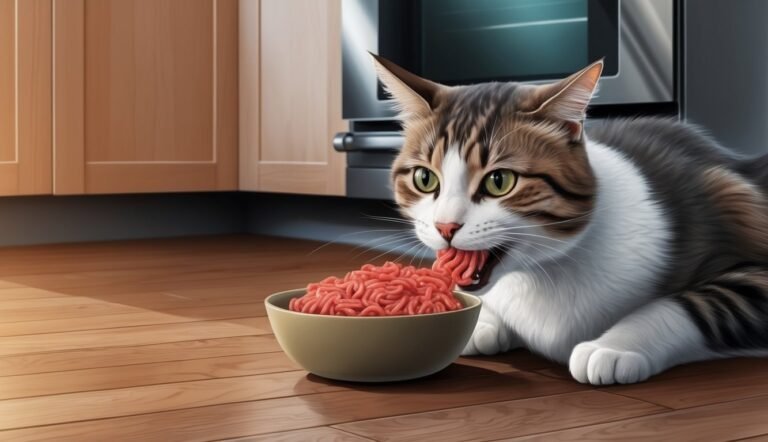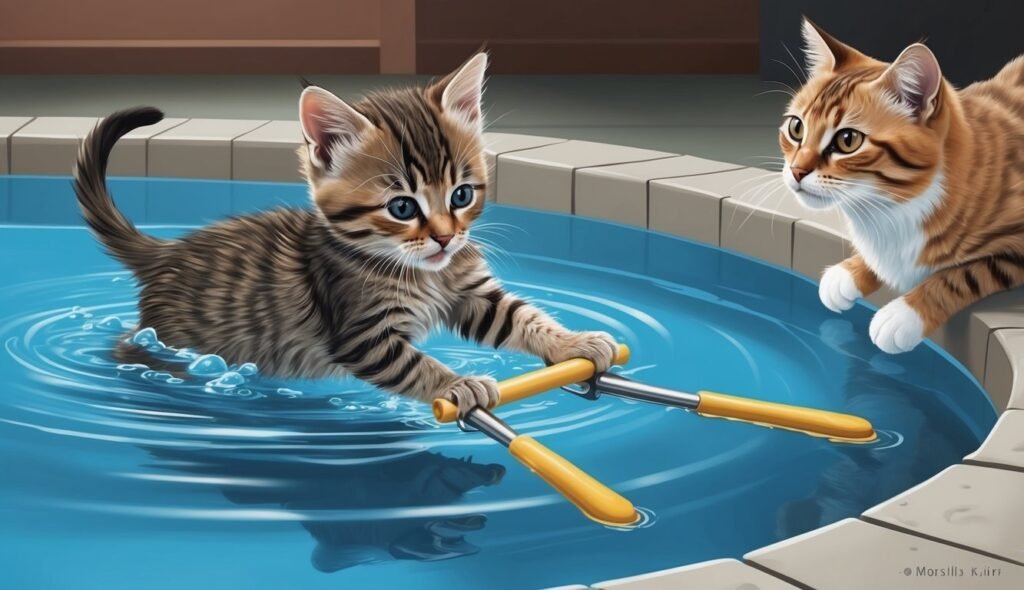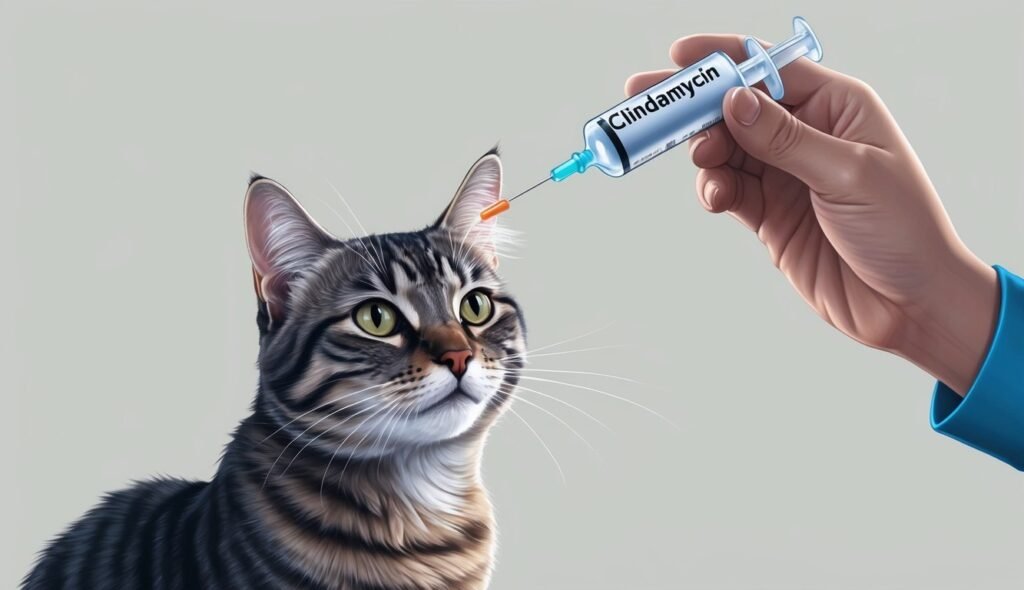Cats rely heavily on meat because they are obligate carnivores.
If you’ve ever wondered about including ground beef in your feline friend‘s menu, you’re not alone.
Yes, cats can eat ground beef in moderation, and it can even provide essential proteins and nutrients when properly prepared.
When considering ground beef for your cat, it’s important to know how to serve it safely and healthily.
Cooking the beef thoroughly eliminates harmful bacteria, and avoiding any seasonings ensures that your pet’s digestive system isn’t upset.
Always monitor how your cat reacts to this new food and consult your veterinarian for personalized advice.
By choosing the right meat sources and preparing them correctly, you can enhance your cat’s diet without compromising their health.
With the right approach, ground beef can be a tasty treat your furry companion will love.
Key Takeaways
- Ground beef can be a healthy addition to your cat’s diet if prepared correctly.
- Always consult with a veterinarian before changing your cat’s nutrition.
- Monitor your cat’s reactions to new foods to ensure their well-being.
Understanding a Cat’s Dietary Needs
When considering what to feed your cat, it’s essential to grasp their unique dietary needs.
As obligate carnivores, cats thrive on specific nutrients found in animal protein.
This section explores what that means and highlights the vital nutrients and dietary components your cat requires.
What Defines an Obligate Carnivore?
Cats are classified as obligate carnivores, meaning they must consume animal-based protein to survive.
Their bodies are not designed to digest plant material effectively.
Unlike dogs, which can process a variety of foods, cats rely heavily on nutrients found in meat to meet their bodily functions.
This includes essential amino acids and vitamins that are primarily available in animal tissues.
Without these nutrients, your cat may face health issues like muscle wasting or weakened immune function.
Essential Nutrients for Cats
A balanced cat diet should include key nutrients.
Here’s a list of some of the most important:
- Protein: This is vital for strong muscles and overall health. Cats need a higher protein content than many other pets.
- Fats: Healthy fats provide energy and support cell function. They also assist in absorbing certain vitamins.
- Vitamins and Minerals: Essential for various bodily processes, including bone health and overall vitality.
When selecting cat food, ensure it lists high-quality animal protein as the primary ingredient.
This translates to a diet that supports your cat’s energy levels and health.
The Role of Taurine in a Cat’s Diet
Taurine is an amino acid critical for your cat’s health and well-being.
Unlike some animals, cats cannot synthesize enough taurine on their own.
This makes it crucial to include in their diet, primarily through meat sources.
Taurine plays a significant role in:
- Heart Health: It helps maintain the heart’s function and reduces the risk of heart diseases.
- Vision: It supports good eyesight, preventing conditions that can lead to vision loss.
- Reproduction and Development: Essential for breeding cats, supporting healthy kittens.
Ensure the cat food you choose contains adequate taurine levels to promote a healthy, active life for your feline friend.
The Benefits of Beef in a Cat’s Diet
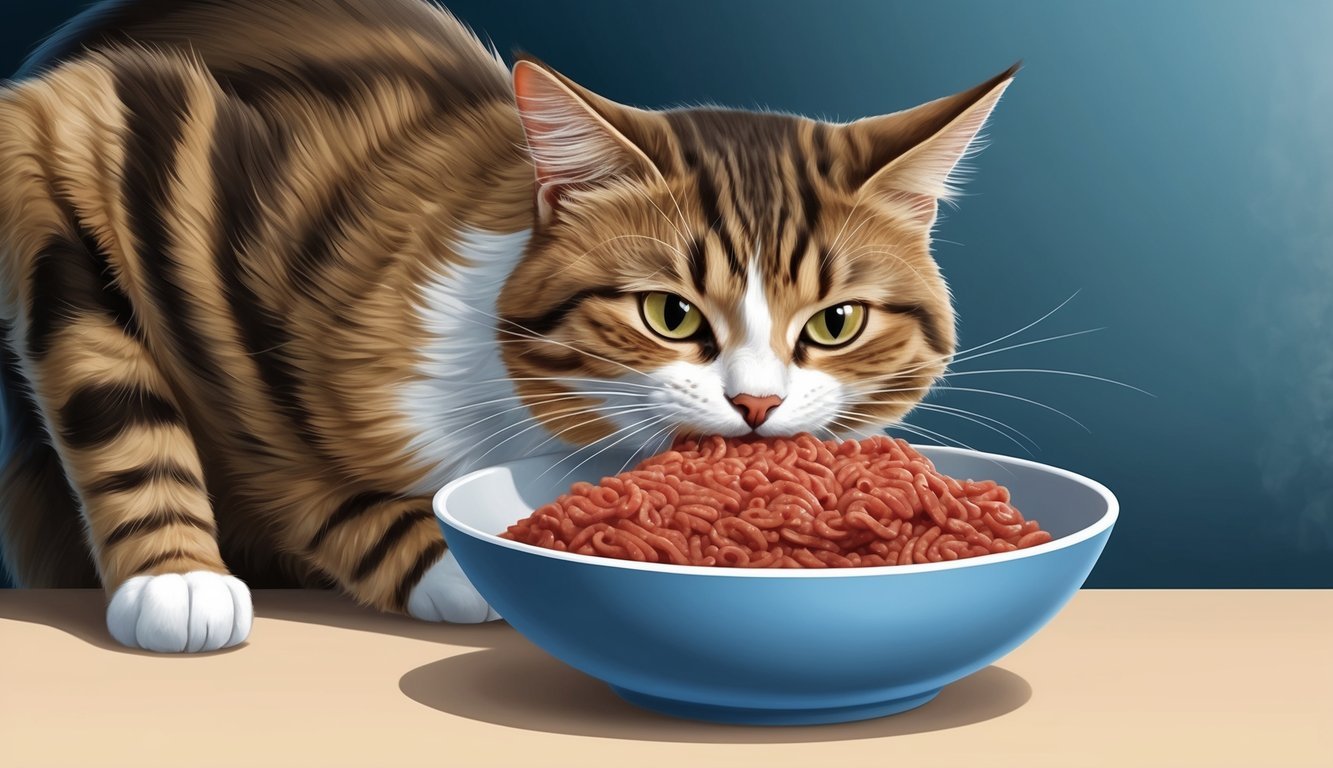
Including beef in your cat’s diet can offer several advantages.
It’s packed with essential nutrients and high-quality protein that support your feline’s overall health, particularly for strong muscles and energy levels.
Beef as a Source of High-Quality Protein
Beef serves as an excellent source of high-quality protein for your cat.
Cats are obligate carnivores, meaning their bodies thrive on animal-based proteins.
Protein helps in the maintenance and growth of strong muscles, which is vital for your cat’s mobility and energy.
Lean beef, in particular, can be a great choice because it minimizes unnecessary fat, promoting a healthy weight.
When adding beef to your cat’s diet, consider serving it in moderation.
Too much protein can be taxing on their kidneys.
Aim for small portions to balance their meals effectively.
Nutrients Found in Beef
Beef is rich in several key nutrients that contribute to your cat’s health.
It contains essential amino acids like taurine, crucial for heart and eye health.
In addition, beef provides iron, which plays a significant role in transporting oxygen throughout the body.
This is especially important for maintaining energy levels and supporting overall vitality.
Other beneficial nutrients include zinc, important for immune function, and B vitamins, which help convert food into energy.
These nutrients make beef a nutritious addition that can align well with your cat’s dietary needs.
When preparing beef, it’s important to avoid any seasoning or additives that could be harmful to your cat.
Keeping it simple ensures your feline friend reaps the benefits without any risks.
Ground Beef: Safety and Nutritional Considerations
When considering ground beef for your cat, understanding the safety and nutritional aspects is essential.
Both raw and cooked options have their pros and cons, and being aware of potential risks is crucial for your cat’s health.
Comparing Raw and Cooked Ground Beef
You may wonder whether to feed your cat raw or cooked ground beef.
While cats may eat raw meat, cooked beef is generally safer.
Cooking beef eliminates harmful bacteria that can cause foodborne illnesses.
If you opt for cooked beef, ensure it’s fully cooked without any added seasonings.
A small amount can offer beneficial nutrients, including high-quality protein and taurine, which is vital for heart and eye health.
In contrast, raw beef may still retain some nutrients, but the risk of digestive problems increases.
Many veterinarians recommend avoiding raw diets due to potential pathogens.
Potential Risks and Allergies
Feeding ground beef can come with risks.
Cats can develop allergies to beef, leading to symptoms like itchiness or gastrointestinal issues.
If your cat shows any unusual behavior after eating beef, consult your veterinarian promptly.
Using ground beef as a supplement to commercial cat food can be fine, but it’s important to introduce it slowly to avoid digestive stress.
Ensure the meat is fresh and stored properly to reduce risks.
If your cat is sensitive, it’s wise to monitor them closely.
Consider keeping beef as an occasional treat rather than a staple.
This helps you manage their diet while still offering variety.
Feeding Your Cat Ground Beef
When considering ground beef for your cat’s diet, it’s essential to introduce it safely and balance it with other nutrition sources.
This protein can be a tasty addition but should be done thoughtfully.
How to Safely Introduce Ground Beef to Your Cat
Start by choosing cooked ground beef that is unseasoned and free from additives.
Avoid any fatty cuts as they can lead to digestive upset.
Begin with small portions, around a teaspoon, mixed into your cat’s regular food.
Monitor your cat for any signs of allergies, such as itching or stomach issues.
If everything goes well, you can gradually increase the amount.
Always ensure that the beef is well-cooked to kill any harmful bacteria.
A consistent check on your cat’s reaction will help you understand how well they accept this new food.
Balancing Ground Beef with Other Cat Foods
While ground beef is a good protein source, it shouldn’t be the only component of your cat’s diet.
Cats require a mix of proteins, fats, and carbohydrates for optimal health.
Consider blending ground beef with commercial cat food to ensure a well-rounded nutrient intake.
This diet can include dry kibble or wet food that provides necessary vitamins and minerals.
Aim for a balanced ratio where ground beef comprises about 10-20% of their diet.
Including other proteins, like chicken or fish, will keep things varied and enjoyable.
Always pay attention to your cat’s overall health and adjust portions as needed for their weight and activity level.
Consulting with a Veterinary Nutritionist
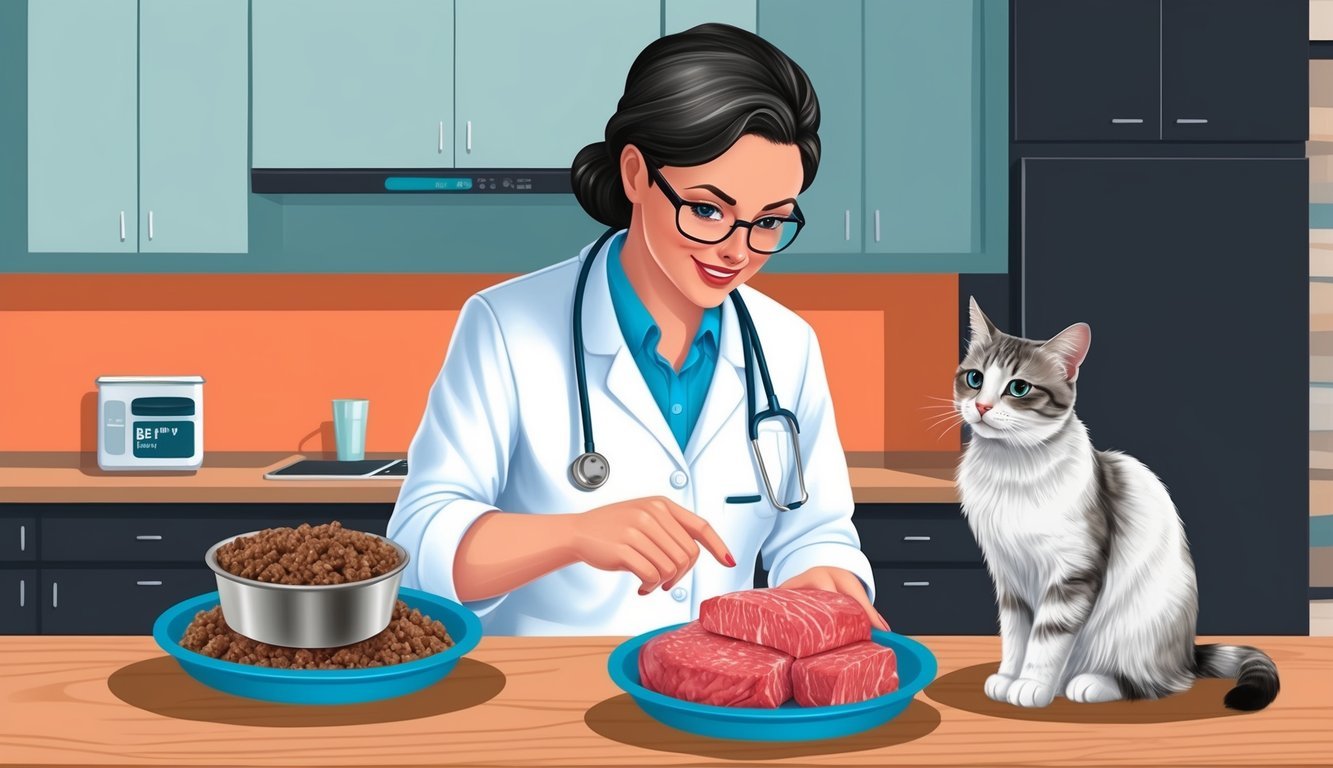
When considering adding ground beef to your cat’s diet, consulting with a veterinary nutritionist is essential.
They can provide tailored advice to ensure your cat receives a balanced diet suited to their specific needs.
The Importance of Professional Guidance
Veterinary nutritionists are experts in animal diet and nutrition.
Their knowledge helps you understand what your cat requires based on factors like age, weight, and health conditions.
Consulting a professional can help you avoid common pitfalls, such as:
- Nutritional Imbalances: Cats need specific nutrients that ground beef alone cannot provide.
- Allergies and Intolerances: A vet can identify if your cat may have sensitivities to beef.
- Health Risks: Raw or improperly cooked beef can introduce harmful bacteria.
Taking this step ensures peace of mind and helps promote your cat’s overall health.
Creating a Custom Diet Plan for Your Cat
A veterinary nutritionist will evaluate your cat’s unique requirements to craft a custom diet plan.
This plan will integrate quality proteins, like ground beef, in a proportion that matches your cat’s dietary needs.
Consider these factors when creating the plan:
- Age and Activity Level: Kittens and active cats may require more protein compared to older or less active cats.
- Balanced Macronutrients: The diet should include not only protein but also the right balance of fats and carbohydrates.
- Supplementation: Your vet may recommend specific vitamins or minerals to complement the meat.
By tailoring the diet, you can ensure it meets your cat’s health goals while incorporating treats like ground beef safely.
Common Human Foods to Avoid
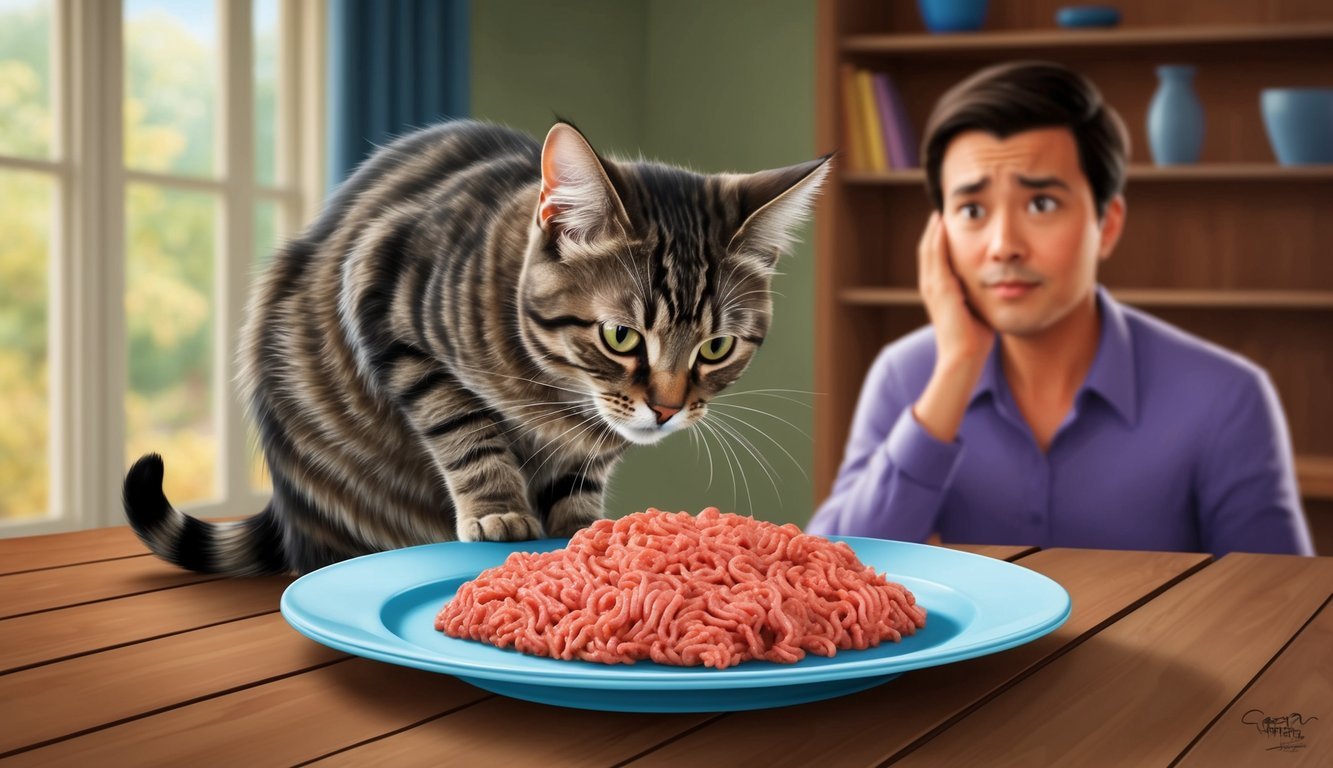
When it comes to feeding your cat, not all human foods are safe.
It’s essential to know which items pose a risk to your feline friend.
Let’s look at some specific toxic foods and the reasons they are unsafe.
Toxic Foods for Cats
Certain foods can be extremely harmful to cats.
Here’s a list of some common toxic items you should avoid:
- Chocolate: Contains theobromine, which is toxic to cats and can cause serious health issues.
- Raisins and Grapes: Even a small amount can lead to kidney failure in some cats.
- Onions and Garlic: These belong to the Allium family and can damage red blood cells, leading to anemia.
- Caffeine: Found in coffee and certain teas, it can affect your cat’s nervous system and heart.
- Alcohol: Even small quantities can lead to severe poisoning.
Make sure these items remain out of reach in your home.
Understanding Why Some Foods Are Unsafe
The reason certain foods are harmful often lies in their chemical composition.
For example, chocolate contains compounds that are difficult for cats to metabolize.
On the other hand, foods like onions and garlic contain sulfur-containing compounds.
These can lead to toxic reactions, especially with prolonged exposure.
It’s important to recognize that some foods that are safe for humans can be hazardous for cats.
Always consult with your veterinarian before introducing new foods to your cat’s diet.
Keeping your pet safe means being aware of these common hazards.
Additional Tips and Best Practices
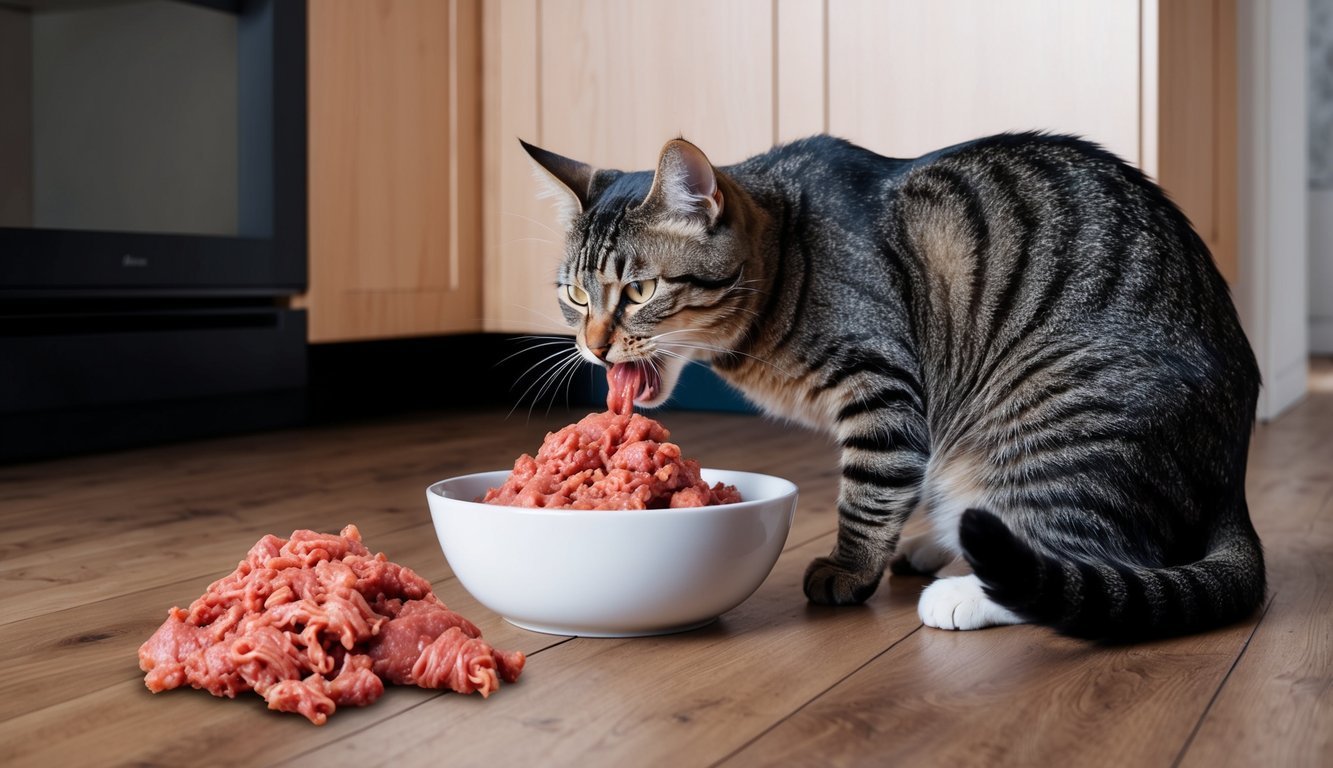
When considering ground beef for your cat, it’s important to balance it with other nutritional sources and be aware of reliable commercial options.
Commercial Cat Food Brands and Their Offerings
Feeding your cat a balanced diet is crucial for their health.
Many commercial cat food brands ensure that their products meet the specific nutritional needs of felines.
Brands like Purina One offer formulations rich in proteins, vitamins, and minerals.
Always check the ingredient list to confirm protein sources, including chicken, beef, or fish.
It’s worth noting:
- Look for meat as the first ingredient.
- Avoid fillers like corn and wheat.
- Check for added vitamins and minerals.
These factors can help you choose a high-quality cat food that complements any homemade meals, including ground beef, and ensures essential nutrients are included.
Incorporating Vegetables and Fibers
Adding small amounts of vegetables can enhance your cat’s diet, but not all veggies are suitable. Carrots, for instance, can be cooked and mashed to provide some fiber, which aids digestion.
When incorporating veggies:
- Choose safe options: Carrots, peas, and pumpkin are generally safe.
- Limit quantities: Vegetables should only be a small part of their diet.
- Aim for about 5-10% of their meal.
- Avoid toxic items: Keep onions, garlic, and certain fruits away from your cat’s meals.
By carefully selecting vegetables and maintaining portion control, you can offer variety alongside ground beef while supporting a well-rounded cat diet.
Frequently Asked Questions
If you’re considering adding ground beef to your cat’s diet, you probably have some important questions.
Here’s a closer look at the safety, preparation methods, and potential risks associated with ground beef for your feline friend.
Is it safe for cats to eat cooked ground beef?
Yes, cats can safely eat cooked ground beef.
Cooking eliminates harmful bacteria that can be present in raw meat.
Just make sure it’s plain and unseasoned to keep it healthy for your cat.
How often can I include ground beef in my cat’s diet?
Ground beef should only be a small part of your cat’s balanced diet.
You can include it a few times a week, ensuring that it doesn’t replace their regular cat food.
Variety is key to maintaining proper nutrition.
Can I mix ground beef with rice as a meal for my cat?
Mixing ground beef with rice is generally fine for cats in moderation.
This combination can add some variety to their meals.
Just remember to ensure the rice is cooked and plain, with no added seasonings.
What are the recommended methods to cook ground beef for cats?
The best way to cook ground beef for cats is to boil or pan-sear it without any oil, spices, or salt.
Make sure it’s well cooked to eliminate any harmful bacteria, and always let it cool down before serving.
Are there any health risks associated with cats eating raw beef?
Feeding raw beef to cats carries health risks, including exposure to bacteria like Salmonella or E. coli.
These pathogens can lead to gastrointestinal issues.
If you choose raw diets, consult your vet for proper guidelines.
What types of meat should be avoided in a cat’s diet?
You should avoid certain meats for cats, including processed meats and those with additives or preservatives.
Also, make sure to steer clear of fatty cuts to prevent health issues.
Always prioritize lean, plain meats to keep your cat healthy.

